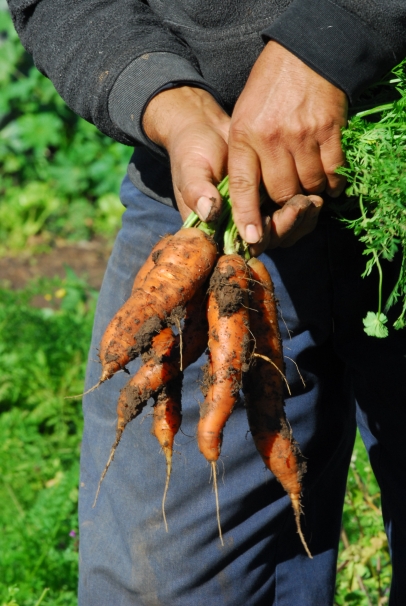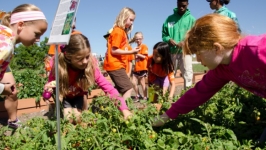Indy Food Council: Building a Better Food System
Imagine wanting to serve fresh vegetables to a growing family but living in a neighborhood that is a food desert: a place void of farmer’s markets, community gardens or grocery stores. Or envision being in the position where a weekly trip to a community food pantry is the primary source of food for a household. In fact, 20 percent of Marion County residents suffer from some degree of food insecurity: They either don’t know where their next meal is coming from, or they eat less than a full meal due to economic circumstances.
In an agriculture-based state known for acres of farmland, it is surprising that 90 percent of items offered in area grocery stores are grown and processed somewhere other than Indiana. Of the $16 billion Marion County residents spend on food, only $2 billion goes to benefit the local economy. This costs Hoosiers jobs and income.
Strengthening the local food system
These are some of the issues Indy Food Council (IFC) is tackling in its mission to strengthen the local food system. Formed in February 2014, under the wing of Local Initiatives Support Corporation (LISC), IFC strives to be a catalyst for an improved food system in the Indianapolis metropolitan area. They hope to develop ways to improve access to, and expand the market for, local food, while providing community-based education programs.
“It’s not about what we do,” says IFC Program Manager Whitney Fields, “it’s what we support, what others are doing to connect efforts to work collectively. We identify gaps and needs and work to fill those.”
From the beginning, IFC has attempted to build better communication with, and awareness of, the different sectors and professions involved in the city’s food system. The key is fostering interaction between participants who are actively involved through vehicles such as the city-wide Food Summit that was held last summer. By listening to residents of neighborhoods as well as the experts, information can be shared and action can be mobilized.
Fields calls these efforts breaking down silos. “Different components in the system can be insular. They are thinking of their own initiatives without realizing that what they do can affect other stakeholders. We try to get as many diverse voices to the table as we can to encourage the sharing of resources to work towards agreed-upon goals.”
Influencing food policy
The IFC advisory board is a diverse group ranging from city officials to health professionals. During the 2015 mayoral campaign, current Executive Committee Co-Chair Kyle Edgell from Green BEAN Delivery, along with then board members Bob Shaver of Slow Food USA and Diana Winters, a professor at Robert H. McKinney School of Law, wrote a series of op-eds that set forth policy recommendations from IFC. Mayor Joe Hogsett took notice and appointed Shellye Suttles, who holds a PhD from Purdue, as the city’s first Food Policy and Program Coordinator.
“The vision that IFC has for the local food system fits with Mayor Hogsett’s vision,” says Suttles, who is now part of IFC’s advisory board. “I am happy to be part of an organization where everyone is open to collaboration.”
Incubating initiatives
When consensus among food community stakeholders is reached, IFC acts to support and advance initiatives. Nurturing these fledging programs involves helping diverse sectors connect with each other, aiding their growth until they can stand on their own. These varied programs not only have the goal of providing citizens access to enough food to lead a healthy, active life, but oftentimes contain an educational component.
When Double 8 Grocery stores closed in Indianapolis, it left the northwest area neighborhood without a source of fresh vegetables. With the support of IFC, the Kheprw Institute developed the Community Controlled Food Initiative. Unlike traditional community-supported agriculture (CSA) harvest subscription programs, where the entire fee is due at the start of the season, patrons can pay by the month. And Supplemental Nutrition Assistance Program (SNAP) customers have their dollars matched. Held the second Saturday of the month from 4 to 6pm, it also offers a cooking demonstration and community discussion.
IFC’s Neighborhood Food Champions Program is designed to empower local residents who are passionate to develop a sustainable-food project in their neighborhood. A small group of participants are carefully chosen from applicants and range from teachers to cultivators of community gardens. They attend weekly workshops led by an area expert on topics such as grant writing, advocacy and community organizing. At the completion of the program, a field trip is taken to another city to see firsthand how best practices are implemented. In addition to a $50 weekly stipend, a small monetary award is given to help each attendee begin their individual plan.
Supported by the Englewood Community Development Corporation with added help from LISC and IFC, Farm 360 is an example of working with the resources at hand to benefit the local community. The dream child of Jim Bloom, a former prison chaplain, this enterprise on the near east side grows hydroponic leafy greens and herbs in warehouses that were once sitting empty. Through the USDA’s Farm to School Grant Program, the Indianapolis public school system is able to be reimbursed when buying Farm 360’s locally grown lettuce. It also sells to local restaurants and the majority of its employees live in the neighborhood.
Planning future policies
All board members are involved with developing the State of Food System Report, which will be published this fall. The effort is spearheaded by the sustainability coordinator for Butler University, McKenzie Beverage, along with assistance from students. The report describes current policies and makes recommendations for the future. Subjects covered include: growers and products, health and education, economy and jobs, access and justice and food waste.
Edgell sums up IFC’s involvement in shaping food policy this way: “There is so much happening in Indianapolis around good food. We seek to harness this activity to create a healthy food culture.”
Local opportunities to be a positive force in developing a better food system
The summer apprentice program includes hands-on gardening, personal and leadership development and yoga—no need for previous experience in gardening or yoga, but must be able to communicate how their participation will benefit community. GrowingPlacesIndy.org
Purdue Incubator Farm Urban Network
Connecting participants to other Indianapolis urban farmers. Intended for growers who are producing a crop for more than their own consumption, this program aids in developing both for-profit as well as nonprofit projects and includes access to development opportunities such as the Indiana Small Farm Conference. Purdue.edu
F.E.E.D program at Flanner House
F.E.E.D (Farming, Education, Employment and Distribution) is a workforce development program for individuals aged 16 to 24, who are unemployed, not enrolled in school, and engaged in legal system (usually either awaiting trial or on probation). Additional volunteer options are available. FlannerHouse.com
Indy Urban Garden
Created for individuals or community groups that have a project in mind for city-owned land. Available lots are identified by Renew Indianapolis and the Office of Sustainability connects participants with experienced urban gardeners. Indy.gov







